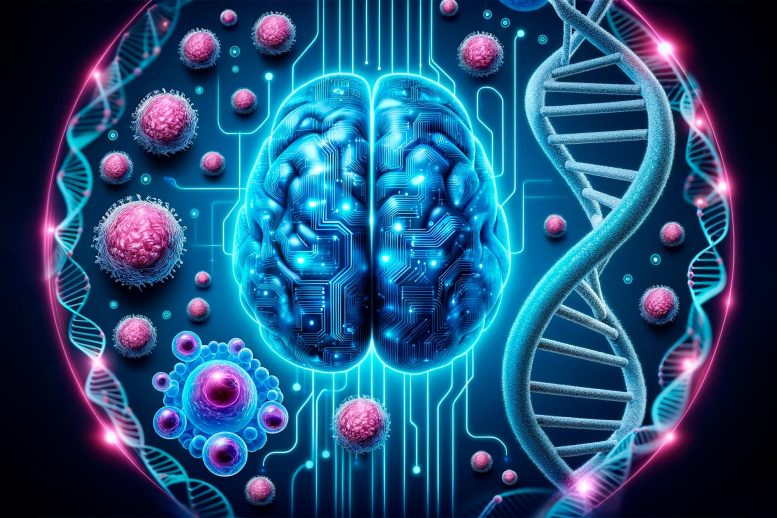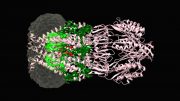
A team at UCLA has created an AI model that uses epigenetic factors to accurately predict patient outcomes in different cancer types. This innovative approach offers improved predictions over traditional methods and highlights the importance of epigenetics in cancer treatment and progression.
UCLA researchers found certain genes encoding epigenetic factors in tumors have a predictive association with clinical outcome across cancer types.
Investigators from the UCLA Health Jonsson Comprehensive Cancer Center have developed an artificial intelligence (AI) model based on epigenetic factors that is able to predict patient outcomes successfully across multiple cancer types.
Epigenetic Factors in Cancer Prediction
The researchers found that by examining the gene expression patterns of epigenetic factors — factors that influence how genes are turned on or off — in tumors, they could categorize them into distinct groups to predict patient outcomes across various cancer types better than traditional measures like cancer grade and stage.
These findings, described today (November 15) in Communications Biology, also lay the groundwork for developing targeted therapies aimed at regulating epigenetic factors in cancer therapy, such as histone acetyltransferases and SWI/SNF chromatin remodelers.
Understanding Cancer Beyond Genetic Mutations
“Traditionally, cancer has been viewed as primarily a result of genetic mutations within oncogenes or tumor suppressors,” said co-senior author Hilary Coller, professor of molecular, cell, and developmental biology and a member of the UCLA Health Jonsson Comprehensive Cancer Center and the Eli and Edythe Broad Center of Regenerative Medicine and Stem Cell Research at UCLA.
“However, the emergence of advanced next-generation sequencing technologies has made more people realize that the state of the chromatin and the levels of epigenetic factors that maintain this state are important for cancer and cancer progression. There are different aspects of the state of the chromatin — like whether the histone proteins are modified, or whether the nucleic acid bases of the DNA contain extra methyl groups — that can affect cancer outcomes. Understanding these differences between tumors could help us learn more about why some patients respond differently to treatments and why their outcomes vary.”
While previous studies have shown that mutations in the genes that encode epigenetic factors can affect an individual’s cancer susceptibility, little is known about how the levels of these factors impact cancer progression. This knowledge gap is crucial in fully understanding how epigenetics affects patient outcomes, noted Coller.
Epigenetic Patterns and Clinical Outcomes
To see if there was a relationship between epigenetic patterns and clinical outcomes, the researchers analyzed the expression patterns of 720 epigenetic factors to classify tumors from 24 different cancer types into distinct clusters.
Out of the 24 adult cancer types, the team found that for 10 of the cancers, the clusters were associated with significant differences in patient outcomes, including progression-free survival, disease-specific survival, and overall survival.
This was especially true for adrenocortical carcinoma, kidney renal clear cell carcinoma, brain lower grade glioma, liver hepatocellular carcinoma and lung adenocarcinoma, where the differences were significant for all the survival measurements.
The clusters with poor outcomes tended to have higher cancer stage, larger tumor size, or more severe spread indicators.
“We saw that the prognostic efficacy of an epigenetic factor was dependent on the tissue-of-origin of the cancer type,” said Mithun Mitra, co-senior author of the study and an associate project scientist in the Coller laboratory. “We even saw this link in the few pediatric cancer types we analyzed. This may be helpful in deciding the cancer-specific relevance of therapeutically targeting these factors.”
AI Model for Predicting Patient Outcomes
The team then used epigenetic factor gene expression levels to train and test an AI model to predict patient outcomes. This model was specifically designed to predict what might happen for the five cancer types that had significant differences in survival measurements.
The scientists found the model could successfully divide patients with these five cancer types into two groups: one with a significantly higher chance of better outcomes and another with a higher chance of poorer outcomes.
They also saw that the genes that were most crucial for the AI model had a significant overlap with the cluster-defining signature genes.
Potential for Broader Application
“The pan-cancer AI model is trained and tested on the adult patients from the TCGA cohort and it would be good to test this on other independent datasets to explore its broad applicability,” said Mitra. “Similar epigenetic factor-based models could be generated for pediatric cancers to see what factors influence the decision-making process compared to the models built on adult cancers.”
“Our research helps provide a roadmap for similar AI models that can be generated through publicly-available lists of prognostic epigenetic factors,” said the study’s first author, Michael Cheng, a graduate student in the Bioinformatics Interdepartmental Program at UCLA. “The roadmap demonstrates how to identify certain influential factors in different types of cancer and contains exciting potential for predicting specific targets for cancer treatment.”
Reference: “Pan-cancer landscape of epigenetic factor expression predicts tumor outcome” by Michael W. Cheng, Mithun Mitra and Hilary A. Coller, 16 November 2023, Communications Biology.
DOI: 10.1038/s42003-023-05459-w
The study was funded in part by grants from the National Cancer Institute, Cancer Research Institute, Melanoma Research Alliance, Melanoma Research Foundation, National Institutes of Health, and the UCLA Spore in Prostate Cancer.









Be the first to comment on "AI Cracks the Cancer Code: A New Era of Epigenetic Insights"